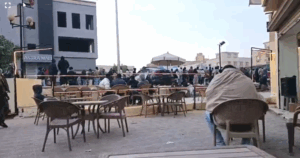UNITAMS head urges Sudanese to reach political agreement soon
“Time is not on Sudan’s side,” says Volker Perthes, the UN Special Representative of the Secretary-General in Sudan, and head of the UN Integrated Transition Assistance Mission in Sudan (UNITAMS). In a statement yesterday, he called on “all parties to show more commitment and political will” in order to form a civilian-led government as soon as possible.
 Workshop on the transitional constitutional framework organised by the Sudanese Bar Association, with the participation of many political and social forces, Khartoum, August 8 (Social media)
Workshop on the transitional constitutional framework organised by the Sudanese Bar Association, with the participation of many political and social forces, Khartoum, August 8 (Social media)
“Time is not on Sudan's side,” says Volker Perthes, the UN Special Representative of the Secretary-General in Sudan, and head of the UN Integrated Transition Assistance Mission in Sudan (UNITAMS). In a statement yesterday, he called on “all parties to show more commitment and political will” in order to form a civilian-led government as soon as possible.
“Almost all Sudanese now agree that the situation produced by the coup of 25 October needs to change,” the statement, titled Sudan and the Prospects of Seeing Light at the end of the Tunnel, reads.
“There are now several political initiatives that propose solutions. We have mentioned more than once that full Sudanese ownership of the political process is the cornerstone for its success.
“It is good that relevant Sudanese stakeholders have begun to meet and talk to one another in a more inclusive manner, making progress towards bridging major dividing lines between – among others – parties that were overthrown on 25 October and other civilian forces. All these parties will now have to prioritize the larger interest of returning to a credible transition. They also must pay attention to the time factor.
“Time is not on Sudan's side,” Perthes warns. “The continuation of the political impasse will lead to more losses of recent national gains. For example, the Paris Club report issued on 14 June 2022, showed that progress under the current situation in the debt relief process, which amounts to US$ 56 billion would be impossible.
“Debt relief was one of the most prominent successes achieved by the previous transitional government. This situation also hinders Sudan from benefiting from the international development assistance, prevents the full restoration of relations with the International Financial Institutions, and also limits my ability to help mobilize international funds for the support of stabilization, development, or the implementation of peace agreements. Reports indicate that one-third of the Sudanese people will face the threat of acute food insecurity this year due to the combined effects of the current economic and political crises.
'The sooner we find a solution, the sooner we can address major concerns outside the Sudanese capital' – Volker Perthes, head of UNITAMS
The UN appeals to “all parties to show more commitment and political will. We call on all major forces, political parties and grassroots movements, including the Resistance Committees, to open communication channels with one another and to think through their ideas and proposals. The comprehensive participation in the political process is something that the Sudanese political forces can achieve by ensuring the widest possible consultations with the actors and stakeholders close to them.
'Major concerns'
Perthes further mentions other issues that have to be addressed by the Sudanese, and include the establishment of commissions for elections, transitional justice, anti-corruption, etc., implementation of the Juba Peace Agreement, completion and consolidation of the peace process and planning a constitutional process, or a comprehensive national dialogue to deal with structural issues left unresolved for too long – such as the distribution of wealth and the relationship between the centre and the margins. “In order to achieve all this, the country needs an effective and acceptable civilian government,” the UNITAMS head states.
“We also cannot ignore that the impact of the political vacuum in Khartoum led to devastating consequences in Darfur, Damazin, Kadugli, Kassala and other parts of the country. The sooner we find a solution, the sooner we can address major concerns outside the Sudanese capital. A peaceful political solution for Sudan will provide the fastest way to ensure the welfare and security of the Sudanese people.”
International and regional support
The UN representative stresses that the UN and the Trilateral Mechanism (African Union, Intergovernmental Authority on Development (IGAD), and UNITAMS, will continue to provide “unlimited support to all Sudanese effort that aim at overcoming the deadlock and finding a way out of the crisis. To this end, we will continue to provide technical assistance and provide a space where divergent views by different parties can be bridged when needed. However, we cannot be more eager to reach an understanding than the Sudanese themselves.
“It is ultimately up to the Sudanese people to embrace, rather than be set back by, their differences, and to exert every effort to urgently agree on a Sudanese-owned solution that meets their shared aspirations. [..] I assure all Sudanese people that the United Nations, its partners in the Trilateral Mechanism and the international community remain committed to Sudan. If the Sudanese walk the walk to bridge these gaps, we will be at their side,” the statement concludes.











 and then
and then